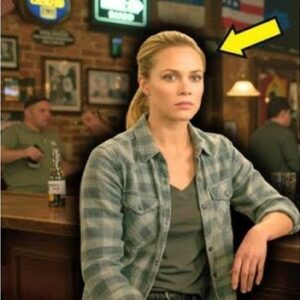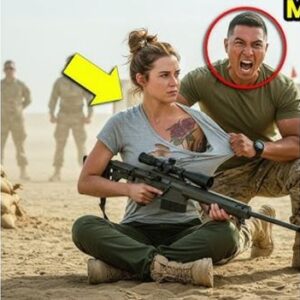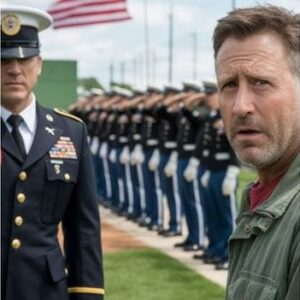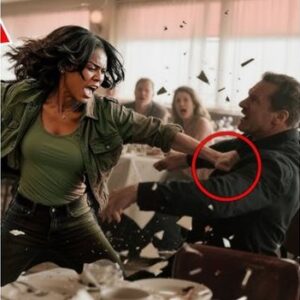Cops Handcuff Black Female General, Her Call to Pentagon Destroyed Their Careers
When General Naomi Ellsworth pulled into a small-town gas station in Mosswood, Louisiana, she never expected her loyalty, her service—to be questioned. Two local officers, fueled by assumptions and ignorance, made a decision that would not only cost them their careers but send shockwaves all the way to the Pentagon. What started as a routine call turned into a national controversy, sparking outrage, investigations, and a powerful stand for justice. This isn’t just about one woman’s experience—it’s about what happens when you refuse to stay silent.
One phone call to the Pentagon was all it took to destroy their careers and show the world that injustice has no hiding place. It was supposed to be just another drive through a sleepy part of Louisiana—the kind of place most people only pass through on their way to somewhere else. General Naomi Ellsworth had made drives like this a hundred times before. No security detail, no flashing lights—just her, a rental car, and a deadline. She had a confidential meeting scheduled at Barksdale Air Force Base. And she didn’t have time for distractions.
But somewhere between Lake Charles and Shreveport, just outside a tiny town called Mosswood, Naomi noticed the signal bars on her secure phone dropping. She needed to make a call. Not tomorrow, not in an hour. Right now. She spotted an old half-for-gotten gas station—Kelly’s Fuel and Food—and pulled into the cracked, uneven lot. It wasn’t pretty, but it was enough.
Naomi parked near the edge of the building, away from the front door where a few locals were gathered, leaning on pickup trucks, swapping stories in the sticky heat. She didn’t think twice about it. To her, it was just a place to get a quiet minute. She grabbed her secure device, stepped out for better reception, and raised the phone to her ear.
“General Ellsworth, verifying identity. Initiating briefing,” she said, her voice low and professional. The Pentagon officer on the other end started the briefing immediately. Sensitive movements, real-time orders—things only a handful of people had clearance to hear. Naomi kept her eyes moving, casually scanning the lot the way she was trained to, but staying focused on the call.
A few people near the gas pump started to glance in her direction. She didn’t look like the folks who usually stopped around here, and certainly not someone in authority without a badge or uniform. She wore jeans, plain sneakers, a loose olive green jacket, and a ball cap pulled low over her short twists. Ordinary clothes—nothing that screamed four-star general. And that was exactly how she wanted it. But not everyone saw it that way.
Inside the station, a woman named Paula Sweeney was watching from behind the counter. Mid-50s, tight blonde bun, permanent frown lines from a life spent judging everyone else. Paula didn’t see a highly decorated war hero. She didn’t even see a woman making a phone call. She saw what she wanted to see: trouble. Paula picked up the old landline and called the Mosswood Police Department. She kept her voice low so the customers wouldn’t hear.
“Yeah, we got a suspicious woman out here by the pumps,” Paula said. “Real shady. Might be on drugs or something. Acting strange. Y’all better come check it out.” She hung up before they could ask too many questions.
Across town, two officers heard the call over the radio and rolled their eyes. Nothing much ever happened in Mosswood. They didn’t mind stirring the pot a little if it broke up the boredom. They threw on their sunglasses, jumped into their cruiser, and sped toward the station.
Meanwhile, Naomi remained by her car, trying to stay laser focused on the conversation. The Pentagon was relaying crucial information that couldn’t afford to be interrupted, but she had no idea that trouble—real trouble—was already on its way.
But just as Naomi reached for her next orders, she noticed flashing lights reflecting off the station windows, and everything around her started to shift. The cruisers screeched into the lot, gravel spitting out from under the tires. Naomi lowered her phone for a second, squinting at the flashing reds and blues. Two officers jumped out before the car had even fully stopped.
The taller one, Officer Randall Cooper—mid-30s, buzzcut, barrelchest—unhooked his holster with a quick flick. The other officer, Sha Delaney—leaner, younger, and too eager—mirrored him. Both of them moved like men looking for a fight.
Naomi felt the air tighten around her. She calmly placed the secure phone on the hood of her car and kept her hands visible, palms open. Her voice stayed measured, controlled, just like they taught her at West Point all those years ago.
“Good afternoon, officers. How can I help you?” she asked.
Cooper barked back. “License and registration, now.” Naomi offered a half step forward, reaching slowly for her wallet tucked into her back pocket. “Absolutely. My ID is right here. I’m active duty military. General Naomi Ellsworth. I’m on official business.”
Delaney scoffed. “General, huh? You expecting us to believe that?”
Naomi pulled out her military credentials and federal travel orders, extending them toward the officers with steady hands. Cooper snatched them away, barely glancing at the documents before shaking his head.
“This is fake,” he said, tossing her ID onto the hood like trash.
Naomi blinked, stunned for the first time. “Sir, I assure you—”
“Shut up,” Delaney snapped. “You think you can play us, lady? You picked the wrong town for that.”
A small crowd was beginning to form—customers, station workers, drivers who pulled in for gas and decided to stick around for the free show. Some whispered, some laughed. No one stepped in.
Naomi’s training screamed at her to de-escalate, but every instinct also told her that these men weren’t looking for answers. They had already decided who she was and, worse, what she wasn’t.
Naomi tried again, her voice low and even. “Please contact your supervisor. You’re making a serious mistake.”
But Cooper already had cuffs in his hand. “Turn around. Hands behind your back.”
Naomi didn’t move. She stood her ground. Not in defiance, but because something inside her broke loose—something heavy. “I am a general in the United States Army,” she said, her voice sharp now. “You are unlawfully detaining me.”
Cooper laughed—actually laughed—loud enough that the people watching heard it echo against the pumps. “Yeah. And I’m the president. Now turn around.”
Before Naomi could say another word, Delaney grabbed her arm roughly. Cooper forced her other wrist behind her back. The cuffs snapped tight enough to pinch the skin. Naomi clenched her jaw, swallowing the flood of humiliation that rose up hot and fast.
Somewhere behind her, the secure phone—still connected to the Pentagon—clattered to the ground. The voice on the other end, hearing the chaos, started yelling her name. But the officers didn’t notice. Or maybe they didn’t care.
Cooper shoved Naomi against the side of her rental car hard enough to rattle the door. Gasps rippled through the small crowd.
“Got her,” Delaney said, like they’d just caught a prize.
Naomi, breathing hard, stared straight ahead at the greasy window of Kelly’s Fuel and Food, her reflection fractured into pieces by the dirt and grime. In that moment, she wasn’t a general. She wasn’t even a person to them. She was just someone to be thrown around because they could. But inside the Pentagon, alarms were already blaring, and Naomi’s disappearance wouldn’t stay unnoticed for long.
Back at the Pentagon, the secure call had gone from strange to alarming in under sixty seconds. Lieutenant Commander Bryce Hanley, sitting behind a wall of monitors in Washington, D.C., stared at the blinking line labeled Jen Ellsworth. Secure. The audio feed was a mess—background noise, scuffling sounds, voices shouting words he couldn’t quite make out. Then nothing but static.
Bryce leaned closer to the mic. “General Ellsworth, this is Command Operations. Do you copy? General Ellsworth, respond.”
No answer. He glanced up at his supervisor, Colonel Dana Sharp, who was already striding across the floor.
“Ping her location,” Sharp ordered. Her voice cut clean through the hum of the operation center. “Right now.”
Within seconds, a technician pulled up a blinking dot on a map. It was nowhere near the base. She was stalled at a gas station right off Highway 171 in Mosswood—a speck on the map most Pentagon staff had never heard of.
Sharp leaned over Bryce’s shoulder, jaw tight. “Get Barksdale security on the line and patch me through to JAG. If something’s happened to Naomi, we’re moving immediately.”
Meanwhile, back in Mosswood, Naomi was sitting on the curb in handcuffs, her back to the wall of the station.
“What’s your real name?” Delaney asked, looming over her like a bad dream. “Who you working for?”
Naomi exhaled slowly through her nose. “You have my ID. My travel orders. Everything you need is right there.”
Cooper snorted. “Lady, you’re about two seconds from being booked for obstruction. Don’t push it.”
Naomi said nothing. She wasn’t going to give them the satisfaction of seeing her beg. Out of the corner of her eye, she caught people pulling out their phones, recording, whispering. Finally, the manager—Paula—stood by the door with her arms crossed, smirking like she was watching a backyard wrestling match. The whole thing was spinning out of control, and nobody seemed interested in stopping it.
Suddenly, Delaney’s radio crackled to life. “Dispatch to Unit 3. Confirm you have detained subject.”
Cooper grabbed the radio off his belt. “Affirmative. Female, early 40s, refusing to cooperate.”
Another pause, then: “Be advised, subject is flagged federal. Repeat, flagged federal. Pentagon has initiated emergency contact. Release immediately and await further orders.”
The blood drained from Cooper’s face. Delaney dropped his smug grin. “What the hell?” he muttered.
Naomi, still sitting there, said nothing. She just stared up at them, waiting. Cooper fumbled with his keys, unlocking the cuffs without meeting her eyes. He muttered something that sounded halfway between “sorry” and “ma’am,” but didn’t have the backbone to say it properly.
Naomi stood up slowly, flexing her wrists where the metal had dug into her skin. The crowd was dead silent now. Even Paula’s smirk had slipped. Naomi picked up her phone from the ground. The screen was cracked. Connection lost. Sensitive information possibly compromised.
She looked at both officers dead in the eye. “You’re going to regret this,” she said quietly. “Not tomorrow. Not next week. Today.”
Cooper opened his mouth like he was about to argue, but a new set of flashing lights lit up the parking lot. This time, it wasn’t local cops. It was a convoy of black SUVs from Barksdale Air Force Base, tires screaming against the asphalt. But Naomi wasn’t waiting for backup. She was already gathering herself for what needed to happen next.
The doors of the black SUVs swung open almost in unison like something out of a movie. But there was nothing glamorous about the way the officers from Barksdale moved. It was pure urgency—no smiles, no greetings, just clipped orders and tight faces. Leading the team was Lieutenant Colonel Darren Mosley, mid-40s, sharpeyed and not here to make friends. He crossed the lot in long strides, a folder tucked under one arm, his gaze locking immediately on Naomi.
“General Ellsworth, are you injured?” Mosley asked, his voice carrying across the lot.
Naomi shook her head once. “No, Colonel. Minor abrasions. The bigger injury was to their careers.”
Cooper and Delaney shifted nervously, realizing a little too late just how deep they were in. The other Air Force security officers quickly closed ranks around Naomi, positioning themselves between her and the Mosswood cops without even being asked.
Mosley turned to the local officers, stone-faced. “You are hereby ordered to stand down pending federal investigation. Any further action on your part could be construed as obstruction of justice.”
Cooper stammered. “We didn’t know who she was.”
“That’s not an excuse,” Mosley cut him off. “You had documentation in your hand. You had everything you needed.”
Delaney tried to play the tough guy still. “She was acting suspicious.”
Mosley stared at him for a long moment, then said quietly, “You saw a Black woman on a phone call and made a choice. That’s going to follow you for the rest of your life.”
The Air Force team efficiently bundled Naomi into one of the SUVs, making sure she was seated comfortably inside. As the convoy pulled away, Naomi glanced back once—just long enough to see Cooper wiping his forehead with a trembling hand and Paula scurrying inside the station like a roach under a kitchen light.
Inside the vehicle, Naomi didn’t say much. She stared out the window at the endless stretch of highway, her thoughts racing faster than the SUV. Colonel Mosley broke the silence after a while. “Pentagon’s coordinating a full investigation, ma’am. Internal affairs, civil rights division. It’s going public whether Mosswood likes it or not.”
Naomi didn’t nod. She didn’t smile. She didn’t flinch. “They should have known better,” she said simply.
Mosley nodded in agreement. “They’re going to find out what it feels like to be seen for who they really are.”
The convoy sped on past fields of tall grass and leaning telephone poles toward the Air Force base, where Naomi’s authority and her dignity would finally be recognized again. But Naomi knew the real battle was just beginning—and this time the whole country would be watching.
News of the incident hit national headlines before Naomi even finished her debrief at Barksdale. Someone had posted the cell phone footage online—raw, grainy video showing two Mosswood cops handcuffing a woman who calmly explained she was a U.S. Army general. No shouting, no resistance—just the unmistakable look of someone being stripped of dignity by people too blinded by arrogance to see it.
It spread like wildfire. By morning, Mosswood wasn’t just a dot on the Louisiana map anymore. It was the center of a growing national outrage. Networks ran the story on repeat. Commentators shook their heads in disgust. Civil rights leaders called it a clear case of racial profiling and abuse of authority. Even veterans organizations, usually careful not to wade into political waters, issued statements demanding justice for General Ellsworth.
Back in Mosswood, the police department scrambled to do damage control. Chief Vernon Grady—a man more familiar with hunting deer than handling press conferences—stood in front of a sea of cameras, sweat beading under his cowboy hat.
“We regret the misunderstanding,” he stammered, avoiding eye contact with the reporters. “The officers involved have been placed on administrative leave pending a full review.”
A young reporter from Baton Rouge cut him off mid-sentence. “Chief Grady, why were trained officers unable to recognize military credentials clearly presented to them? Was race a factor in this so-called misunderstanding?”
Grady stumbled over his words, muttered something about high tensions and mistaken identity, but everyone watching knew. The department was cornered. They had no real defense.
Meanwhile, Cooper and Delaney had gone radio silent. Their names leaked within hours, splashed across headlines, social media, and public outrage forums. Anonymous sources from inside the department revealed that both men had prior complaints—excessive force, racial profiling—swept neatly under the rug before.
Not this time. Civil rights attorneys from New Orleans and Washington, D.C., filed official federal complaints on Naomi’s behalf. The Department of Justice opened an independent investigation. Even the Louisiana governor weighed in, calling the incident an appalling miscarriage of justice against a national hero.
It wasn’t just about Naomi anymore. It was about every person who had been doubted, dismissed, degraded because of a uniform they didn’t wear, a color they couldn’t change, or an assumption they couldn’t stop someone else from making.
At Barksdale, Naomi was briefed constantly—her lawyers, Pentagon officials, even the White House liaison calling for updates. She answered every question with the same steady voice she had used to command troops in war zones. But when she was alone, in the quiet of her quarters, the weight of it pressed hard against her chest. Not because she was surprised, but because after all the medals, after all the service, after all the sacrifice— in a dusty parking lot in Mosswood, none of it had mattered.
Still, she hadn’t spent her life running from battles. And she sure as hell wasn’t about to start now. But if Naomi was going to speak, she knew she had to do it on her terms—not just for herself, but for every silent face watching her from the shadows.
The press conference was scheduled for noon on a Saturday outside the gates of Barksdale Air Force Base. Cameras were already lined up in neat, frantic rows; microphones stacked two and three deep. Reporters murmured into phones. The air was hot, thick, buzzing with a different kind of energy—the kind that meant something important was about to happen.
Naomi Ellsworth stood behind the podium wearing her full dress uniform for the first time in months. Medals gleamed against the deep blue fabric. Her shoulders were squared, her gaze unflinching. She wasn’t here to entertain. She wasn’t here to make anyone comfortable. Colonel Mosley stood off to the side, arms crossed, watching protectively. A few senior Pentagon officials flanked him, grim-faced. They had offered Naomi carefully worded talking points—diplomatic phrasing, a safe path through the minefield. She politely declined.
When Naomi finally spoke, her voice was clear enough to cut through every rumble of traffic, every click of camera shutters. “My name is General Naomi Ellsworth,” she began. “I have spent twenty-nine years serving this country—leading soldiers, advising presidents, defending the ideals written into the Constitution. Yesterday in Moswood, Louisiana, none of that mattered.”
She paused, letting the words hang in the heavy air. “I was judged not by the content of my character, not by the uniform I’ve earned, but by the color of my skin and the assumptions made about me because of it.”
Reporters scribbled furiously. But Naomi wasn’t speaking for them. She was speaking to the people who had seen the video—who had felt a familiar pang in their gut, a sharp memory of being doubted or demeaned or dismissed.
“I’m not here today for an apology,” she said. “I’m here because silence is not an option. Accountability matters. Respect matters. Human dignity matters. And none of these are negotiable based on someone’s prejudice or someone’s ignorance.”
Behind the cameras, members of the local community had gathered—Black families, veterans, students holding handwritten signs. Naomi caught glimpses of their faces. Some angry, some hopeful. All of them waiting for something they hadn’t seen enough of lately: real leadership.
“Injustice is not new,” Naomi continued. “But change only happens when enough people refuse to look away.”
She finished with no dramatic flare, no rehearsed slogan—just the truth. “I was not humiliated yesterday. They were. And history will remember it that way.”
She stepped away from the microphone without waiting for questions. The applause started small—a few claps from the crowd—but quickly grew into something real, something alive. As she made her way back toward the base, Naomi didn’t walk faster or slower. She moved with the same steady pace she always had, one step after another, carrying more than just her own story on her back.
Because she knew the world wouldn’t change overnight. It might not even change in her lifetime. But maybe—just maybe—it would change a little because she refused to stay quiet.
When you’re treated unjustly, your voice is your greatest weapon. Speak the truth even when your hands are shaking. Someone out there needs the strength you show. If you believe in standing up for dignity and accountability, share this story. Speak up when you see wrong. Change starts with people willing to call it by its





